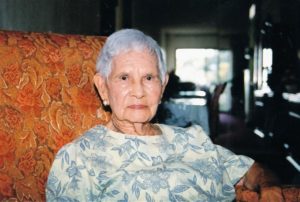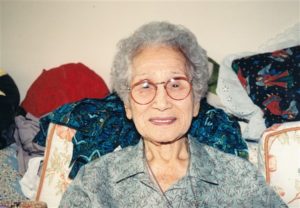In this present age, when the elderly are viewed as burdens to the society, Meera Shashidhara’s book, Living To Be a Hundred, presents a breath of fresh air in celebrating the wisdom of nineteen centenarians from different origins and walks of life. Many of them are immigrants. In this collection of memoirs, these brave men and women tell the stories of their immigration to America in the early twentieth century, their lives and loves, their joys and pains, their losses and victories. One thing that stands out in their accounts is their passion for life, whether they were working on the Manhattan Project producing nuclear weapons or playing mahjong with their family. As Harry Miller, who worked for a fashion retail store until he turned ninety-eight, responded when asked about retirement, “Retirement? I retire every night, about 11:30!”
Meera Shashidhara has arranged the book in two parts, “Hundred Year Old Stories” (the firsthand accounts of the contributors) and “Hundred Year Old Voices” (the views of the contributors on various topics), spanning thirty-two subsections. The presentation of the book as a collection of very entertaining anecdotes by people of different lifestyles and characters, makes for an extremely interesting read. The author allows the contributors to express themselves in their own words; therefore the book does not sound like a history textbook, but brings history alive in its pages. The narratives take the reader on diverse journeys from the late nineteenth century into the twenty-first century; from Communist China to Colonial slavery in Louisiana; from the chemical lab at the University of California, Berkeley, to the sorority house at Baker University.
This book is great for anyone who desires to gain a better understanding of the journey of life through various perspectives, and expressed in different ways.
I enjoyed reading this book. The stories are so real and captivating, and the simplicity of life led by these man and women made me ashamed of our dependence on ephemeral things. Reading this book brought back a flood of memories of the simple and happy life my own grandparents experienced. I believe that this book will make a great gift for the young adults (as well as some older adults) in our lives.
Here’s an excerpt from Meera Shashidhara’s book Living To Be a Hundred
“Undeniably so, there comes a moment in each of our lives when we are hurled to encounter the deeper questions of creation – the meaning and very purpose of our being, for instance. Perhaps when tragedy strikes someone close, someone too young; or when the savagery of terrorism opens its fangs close-by; or when that invincible feeling that only youth is privy to, quietly tiptoes out, leaving us to fill a physical and spiritual cleft.
The 21st century dawned ushering in a new era of gadgets and gizmos, taking productivity to frenzied levels. As scientists march towards extracting stem cells from human clones, we may be overlooking the obvious. As dieticians prescribe a new fad by the day, we may be indulging and bulging a week later. As gadgets steal our time from community, we may be letting go of the essential, the human element. As we demystify nature, we may forget to soak in its charm. As we spend hours in front of computers, we may be in reverse gear with Darwin’s Theory of Evolution. As tragedies and terrorists unleash their savagery, we may be here today, gone tomorrow.
Nineteen centenarians from a cross-section of society share their memoirs intertwined with the history of their century as they experienced it – they were ordinary people who lived extraordinary lives. They share their collective wisdom, their values, beliefs, habits, attitudes and lessons learnt and tell us how to harmonize between science and soul. They were around from the rustic horse and buggy age till the sequencing of the human genome. They witnessed the Big Bands performing, the railroads being constructed, and Mahatma Gandhi’s nonviolent methods of countering the British. Most of them have first-hand experience of the Great Depression, the World Wars, Japanese invasion of China, Indian freedom fight, and even racial discrimination. They’ve lost their children to war and poverty. What makes them tick? What inspired them and kept them spirited? What did they learn from history? How did they find the strength and the spirit to keep going in times of despair? What is the 21st century’s hope for more fulfilling lives? As they narrate their stories, thoughts, and secrets, they offer us hope for health, longevity and a saner world.
A lot of what they have to say, we each one know already, but some of it only comes with age and experience. Although the number of people interviewed may not be statistically significant, I feel that the collective knowledge and intelligence that is in the following pages is sufficient to last us a hundred years. Given the age, I found their exuberant attitude and vitality in life incredible. It’s the same feeling that we get when we soak in with awe, standing in front of 100-year-old oaks or a herd of elephants, the richness of life.
Apart from good genes, several striking similarities recur in their lifestyles, which may provide an insight into their healthy longevity. They all maintained extremely active lifestyles well into their hundreds, both physically and mentally. They read a lot. They never stopped learning. They had a liberal outlook. They were mostly extroverts. They shared a natural love for people. They pursued art in some form or another. They lived for the moment. They found something that they loved doing. They all led useful, altruistic and full lives. They hardly went to the doctor. Love, hope and faith carried them through.
Perhaps they were born at the best of times. Agriculture was yet to be industrialized and assaulted by the apparatus of pesticides and synthetic fertilizers. Food was not genetically modified. Most of them were born and raised on ranches and they ate fresh, nutritious and wholesome food. Since cars were still a luxury, they walked everywhere. They also worked incredibly hard, paved the paths that we travel today and built communities. By the time they reached their 60s, the progress of medical science was spectacular and some of them have been able to take advantage of that, although for many of them (that are presented here), it has not been necessary.
Most of the people I talked to were driving and dancing well into their late 90’s. Harry Miller, at 102 would like to go back to work as soon as a little wound in his leg feels better, (by the way, it was the doctor that complicated the wound); for Flora Mae, she just has so much she still wants to do and does not have enough time, that age to me, has become extremely relative now.
Through their diverse backgrounds, I found one common thread, the ‘unified truth’, which makes these centenarians stand out. It is simply their positive attitude coupled with a terrific flair for humor, regardless of the circumstance they are in. This sheer sense of optimism, almost divine, is perhaps why they all have a tremendous ability to bounce back in the face of adversity, repair themselves, and easily adapt to change. One can win any battle with an optimistic outlook. Research on wellness shows that there is an enormous connection between physical and psychological wellness. In fact, a healthy, liberal outlook can influence our ways of thought and thus make way for improved quality of life.
To skim over some of the lessons learnt, the essence of life is in family, children, and helping others. Family is our most dependable sanctuary, and deserves utmost care. Relationships take precedence over materialism. Cultivating a good rapport with nature is not only therapeutic, but also vital to our existence. With the onslaught of modern distractions, we are rapidly losing our affinity with nature. As we condition ourselves with technology and such gadgets, our Neanderthal instincts, impulses and immunity get dulled and we lose out on a lot in the process.1 If we endanger ecosystems, we endanger ourselves, and our children.
They concur that all religions finally teach the same values: respect for nature and humanity, and that the ultimate cause of every religion should be to work towards uplifting humanity. All men are created equal. “The Bhagavad Gita says that the purpose of life is to love others and to be compassionate towards all living beings. The body is temporary, but the soul is eternal”, quotes Lakshmidevamma. “The Vedic scriptures teaches us to be non-violent, not to follow slavery, to be a non-aggressor, not to exploit, to be kind, follow Universal brotherhood and to believe in God”.
Education is indispensable. “It’s the non-destroyable asset you hand down to your children” says Srinivas Rao. ‘Home’ is anywhere in the world where your heart is at peace. It’s all right to do anything moderately as long as you are not hurting yourself, and a little brandy once in a while seems to really help. Traveling all over the world and encouraging tourism is rejuvenating, spreading peace is a thumbs up, and war is a big thumbs down. “None of us need war, it kills our children” says Flora Mae. Not all of them believe in God, but they sure believe in people. Andrew succinctly summed it up by saying, “You can be a non-believer in God, but you definitely have to believe in people to make it to a hundred”
1 Reference: “Small Silences”, listening for the lessons of nature. By Edward Hoagland, Harper’s, July 2004
…….read on the beautiful memoirs of vibrant centenarians, (mostly immigrants) by buying the book on Amazon….






